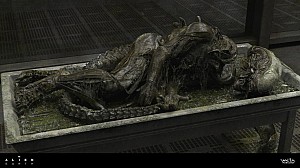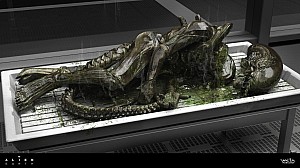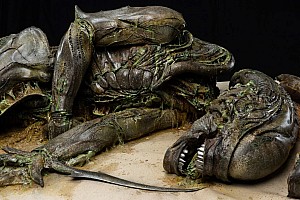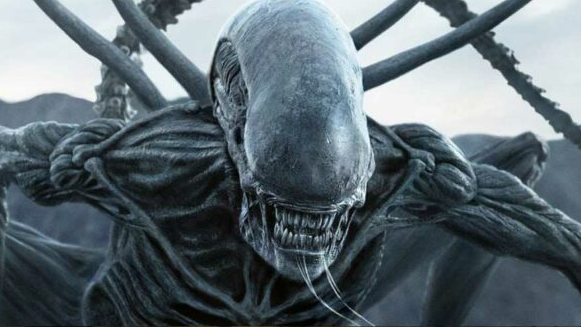Sigourney Weaver talks about ''Alien3''. The star reveals details about the making of the movie and her future - By James Kaplan
Sigourney Weaver finds herself stranded on a planet infested with rapists, lice, and an acid-spitting monster in the latest instalment of the scariest sci-fi series ever. And that was the easy part. Now she's abandoning the role that made her a power in Hollywood, as Ripley signs off for good in Alien3

''The Bitch is back,'' the Alien3 trailer intones, over a shot of a terrified, stubble-skulled Sigourney Weaver, as Lieut. Ellen Ripley, vis-a-vis The Thing Itself-drooling, metallic, infinitely evil. And you wonder, if only for a second: She? Or It? ''They called me about the trailer, of course, it had already been made,'' Weaver says. ''And I said, 'Am I supposed to be the bitch?' They said, 'No no no no no it's really like the profile of the alien against your cheek.'
''I think anyone who's seen Aliens knows that the bitch is this creature,'' she says. She sighs. ''Anyway, there was nothing I could do about it.''
We're meeting in a posh Madison Avenue hotel not far from the East Side home the 42-year-old Weaver shares with her husband, theatre director Jim Simpson, 36, and their 2-year-old daughter, Charlotte. Off screen, the star seems softer and more delicate than the characters she has played: The rapt, queenly, Klimt face is small, the skin lightly freckled. There are crow's-feet at the corners of her dark eyes.
She's wearing a decidedly terrestrial, even suburban, outfit: red gingham blouse with the collar flipped up, blue slacks, plain pumps. This is Ripley? But then I notice her hair. Even though it has grown back in, it's still short enough to hint that she's been through something. Something trying.
Like the actors who played the inmates and wardens of the prison planet Fiorina 161, Sigourney Weaver actually had her head shaved — a risk not many female (or even male) stars would take. This risk, however, pales beside the principal one in Weaver's career these days: Alien3, by far the most troubled, difficult production in the series, is the end of the line for Ripley.
Thirteen years after Alien, Weaver is stepping quite happily off the cash train she stepped onto at 29, when — an unknown, too-tall stage actress — she became, more or less by accident, the first major female action-adventure star and, eventually, a first-rank power in the movie business.
Power being measured, of course, by the familiar standard: The $4 million she was reportedly paid for Alien3 (plus a share of the box office receipts) places her, for the moment at least, at the top of Hollywood's elite group of actresses earning in the multiple millions. Now the series that made her rich and famous will have to go on, if it goes on, without her. And leaving was all her idea.
''In the original (Alien3) script, the male lead sacrificed himself, and Ripley goes off, again, into space,'' she says. ''And I got to the end, and I thought, 'Oh, God.' I said, 'This is it.'''
Her voice lacks Ripley's clipped, hortatory quality; instead, the broad vowels and plummy tones put one in the mind of The Great Gatsby, the book from which Weaver borrowed her first name when she was 14, having been christened Susan. She grew up on Manhattan's Fifth Avenue, a child of privilege, the daughter of legendary TV executive Sylvester ''Pat'' Weaver (as president of NBC, he invented the Tonight and Today shows) and former British stage and film actress Elizabeth Inglis (The 39 Steps).
The patrician package comes complete with eccentricities. My first Weaver sighting ever is in Manhattan on a winter afternoon: There she is, all six feet of her, striding down Columbus Avenue in a long coat and this hat, perhaps a foot tall, a hat that could easily be of extraterrestrial origin. She seems at once solemn, goofy, strangely beautiful. There is the piquant fact that when she was at Yale drama school, her teachers pronounced her fit only for light comedy. The Alien series, for all its otherworldliness, has put a rein on her appealing oddities, qualities she has better evinced as the possessed cellist in Ghostbusters, the obsessed naturalist in Gorillas in the Mist, and the bitch-businesswoman in Working Girl.
Not since Katharine Hepburn has a star brought along such distinctive, and distinctively Eastern, baggage. Nor is this merely a matter of style. Like Hepburn, Weaver exudes an aristocratic intelligence, an air of command, that sets her apart from the run of female stars. Her endless legs and strong jaw don't hurt, either. Yet even in her creamier, dewier days, in the first Alien, her power emanated as much from mind as body: The famous BVD shots were more punctuation than point. You looked at her as she stripped down and thought, My God, all this — and lissome, too.
And now she has completed some kind of cycle. ''I felt that if I put everything I could into this last one,'' Weaver says of Alien3, ''I could help make it as good as it could be.'' The shaved heads in the movie give eerie emphasis to the actors' eyes, and none are more haunting than Ripley's: This is a character who, after two films full of face-hugging and chest-bursting monsters, has arrived at an accommodation with death. When the convict Morse (played by Danny Webb) screams in her face that he'd like to shove her head through a wall, she towers over him not only physically but morally: Her utterly composed stare is one of complex resignation to the brutality of the universe.
Then again, maybe Sigourney Weaver has come to feel similarly about the movie business.
It used to be so different. For years after she graduated from Yale in 1975, Weaver couldn't even get an agent, let alone a film role. ''They would come see me in whatever play I was in, see how tall I was, then leave," she says. One finally stayed. And promptly got her an audition for a science-fiction film. ''I thought, 'This is not my future,''' Weaver says, wryly broadening her upper-crust drawl. '''My future is being in lots of wonderful Woody Allen pictures.''' (She'd already had a tiny walk-on in Annie Hall as Woody's date outside the movie theatre near the end.)
The whole thing seemed like a bad joke. ''I put on these big hooker boots, up to here.'' She laughs, pointing to her long thigh. The audition was, of course, for Alien, before it was Alien. And Weaver was just a six-foot unknown actress with an attitude. But director Ridley Scott kept an open mind. ''The first thing Ridley did was show me the drawings of the alien by (Swiss artist H.R.) Giger,'' Weaver says. ''And I was impressed. They were very erotic, very dark and disturbing. The alien himself looked like this huge penis running around.''
She still wasn't swayed. ''They gave me a script, and the next day, when I came back, I was very critical about it. It's incredible — here I was, this nobody. The casting person was like this.'' Weaver mimes gritting her teeth and shaking her head. ''But Ridley listened, for some reason.
''I began to get the sense, as I had with some of the Off Off Broadway stuff I'd done, that these guys were going to do something really neat.''
The Sigourney Weaver of 1978 had few references outside of high culture, little idea of the growing buzz about the nascent project, no sense that a number of agents were pushing their big-name clients as the first female action star. And it all just added to her aura.
''We felt that if Ripley was a big name, she would lose part of her mystery,'' says David Giler, coproducer (with Walter Hill) of Alien. Anonymity carries its own mystery. ''Sigourney walked through the door, this tall, strong, decent-looking woman, and we knew she was the one,'' Giler says — failing to mention the hooker boots. Still, he says, ''It was not the studio's choice to test her.''
''I was at a very idealistic stage then," Weaver says. "I'd never got sucked into the whole Hollywood thing. It wasn't until the day before they flew me to England for the screen test that I said to myself, 'You'd better get serious about this.'''
Giler recalls that then Fox chief Alan Ladd Jr. saw the test and decided on Weaver, but Weaver's story is better. ''Laddie called in all the secretaries, showed them the test, and said, 'Do you like her?' And they did. They got me the part.
''I was extremely lucky,'' Weaver says. ''I didn't know it at the time.''
''A movie of this size, with this kind of pedigree (and combined grosses of $140 million for the first two installments) needs to pack a huge wallop,'' says Roger Birnbaum, president of worldwide production at Fox, a man who tends, unashamedly, to refer to the Alien series as "the franchise.''
The franchise, the magic industry term that connotes a film concept so potent it can survive sequel after sequel, was not magic to the star. ''It made me crazy,'' she says. When I ask if the term ever reminded her of Weyland- Yutani, the mythical, malevolent ''Company'' of the series, she nods quickly. ''Exactly,'' she says.
Weaver had been bitterly disappointed by her experience with Alien's first sequel, Aliens after Fox cut two minutes of footage she considered crucial to Ripley's relationship with the space orphan Newt.
''I think (Aliens director) Jim Cameron is sort of upset with himself that he let that happen,'' she says. ''It was a little scene after I woke up. I'm sitting in this fake patio, and Paul Reiser comes in and says, 'I didn't want to tell you before, but your daughter died two years ago, and this is all I have left of her.''' Reiser's character then handed Ripley a picture of the daughter she'd left at age 10, who had become an elderly woman during her mother's space travels. (The photo was actually of Weaver's own mother.) ''I based her whole trauma on the fact that she'd lost her family. She'd paid horribly for her success in surviving the alien.''
The studio went on to promote the picture as a straight action adventure, with an emphasis on guns. ''I guess that's why I didn't want to make another one, partially,'' Weaver says. ''Because it's such a fight. I'm doing it for my reasons, the studio's doing it for their reasons. And sometimes they hardly intersect.
''It's gotten so hard to make them,'' she says. ''Every time you do another version of this story, it gets harder to have it live up to the others. And you always have new people at Fox.''
Accordingly, when producers David Giler and Walter Hill told her, in early 1990, that they were commissioning a Ripley-less Alien3 and would come back to her for the fourth instalment, she didn't argue. ''I felt Ripley was going to become a burden to the story,'' she says. ''There are only so many aspects to that character you can do.''
But Fox's new president, Joe Roth, felt differently. ''Sigourney Weaver is the centrepiece of the series,'' he says. ''She's really the only female warrior we have in our movie mythology. In successful sequels, you have a fine line between old and new ingredients. We felt it would be cataclysmic to proceed without her.'' So the cataclysm proceeded with her.
This is a movie that began shooting (at Pinewood Studios, in London, for both economic and artistic reasons) without a finished script and wasn't completely cut until a few weeks before its release. A project that has gone through three directors, eight screenwriters, innumerable script drafts telling several dissimilar stories, both with and without Ripley.
Also a Writers Guild strike, the gulf war, mammoth cost overruns, a change in studio leadership. Tantrums. A serious special-effects accident. Producers who lost their power as soon as they became the writers of the final draft. Reshoots that cost millions to produce moments of film. Everything, it would seem, but a plague of locusts and boils.
Still, Sigourney Weaver had fun.
''There was a great deal of worry from the studio,'' she says. ''Fox had just finished Die Hard 2, which cost an incredible amount of money. And they were sort of afraid this would happen to this one. Because when we started — when (director David) Fincher came on the picture — they were like $7 million in the red (on the project).''
But her initial scepticism about Fincher, then a 27-year-old novice whose previous experience was limited to music videos (including Madonna's "Express Yourself" and "Vogue"), quickly turned into admiration when she saw that his technical mastery was matched by a precocious sensitivity to his actors. ''He is so cool, this guy,'' Weaver says. ''I just can't believe what he's endured.''
She is talking about Fox's ''attempt to micromanage every financial detail,'' as David Giler puts it. Via transatlantic telephone, the studio kept the young director on the tightest possible tether, reportedly even dictating when the lights should go out on the set each night.
Despite the pressure, Fincher seemed unfazed. ''We just cracked jokes through the whole shoot,'' Weaver says. ''A lot of it was at the expense of Fox. It was the only way to survive. Our producers had abandoned us, and because of the gulf war, Fox people weren't coming over. We were like kids putting on a show in the barn.''
And Weaver herself had changed, from the serious young thespian uncertain about the honour of doing movies at all, let alone big commercial movies (Bill Murray used to tickle her before takes on Ghostbusters to get her to loosen up), to a grown-up taking the longer view. ''I had my daughter with me, so my life was very civilised, very balanced,'' she says. ''Every day I got to leave this terrible lice-ridden planet to have lunch with Charlotte. I had trouble sometimes bringing myself down again. I was having such a good time.
''A lot of actors work from agony and insecurity,'' she says. ''But the longer you work, the more you realise that's just taking you away. I've learned from certain magical people I've worked with — Michael Caine, Gérard Depardieu — to love being there.''
But will the Alien3 audience feel the same way? Fox may have trouble squeezing blockbuster performance out of this poundingly grim, low-tech movie about the creature's predations on what one character calls ''a bunch of lifers who find God at the ass end of space'' — a movie that is black-humored at best and whose ending can only be described as downbeat.
David Fincher, who gave one stressed-out interview after the completion of principal photography, isn't talking. Fox's Roger Birnbaum sounds a bit nervous. ''I think the picture will find an audience,'' he says gingerly. ''The core of Alien fans will go back. I think this movie holds up the integrity of the franchise."
And what of the Sigourney Weaver franchise? It's far from certain that she'll ever see a $4 million fee again. Ask her about it and she's typically matter-of-fact. ''With the end of this series,'' I begin, delicately, ''can you retain...''
''My power? Probably not,'' she says, crisply. ''If I weren't such a terrible organiser, I'd have figured out a way to make this big release work for me — you know, line up the next four films. But I'd rather have more grandchildren and fewer films in the can.''
''You could still have a life,'' the scientist Bishop says to Ripley, just before the headlong climax of Alien3. ''You could have children.''
Sigourney Weaver seems to have taken this movie advice to heart. Family, and time, are much on her mind these days. ''I probably won't be doing a lot of work for the next couple of years,'' she says. For one thing, her parents are in their 80s. For another, 'my daughter's so little — I don't like being away from her. But also, I would like to have another child before it's really too late. Which has sort of meant removing myself from competition for quite awhile.
''Basically, for the last year I told my agent I didn't want to take any work. It's a little frustrating to be sent scripts that are wonderful but that maybe demand my going to Africa or somewhere. This time goes so fast, and soon my daughter will be in school. I think if I miss this time with her, I'll always regret it.''
At the same time, ''I think I've suddenly reached an age and a time in my life where I feel that I am sort of hitting my stride,'' she says. ''And I feel like I might be able to say, 'Yes, I can try anything.'''
Through her production company, which is bankrolled by Fox, she's developing several literary properties, some of which she may star in, some of which she may simply produce. Then She Found Me, a 1990 novel by Elinor Lipman, tells the story of a Boston schoolteacher, brought up by adoptive parents, whose life is thrown off balance when her flamboyant birth mother appears. She also hopes to remake Dear Rosie, a 1990 British short film about a single mother who writes a best-selling book and becomes an instant, very wealthy celebrity.
And of course, she gets sent plenty of screenplays. ''I don't know if the business is changing if more women are writing these great scripts or there are more women directors, but I feel something incredibly exciting is happening,'' she says. ''I'm seeing some parts — they're not blockbuster movies, but boy, are they interesting. I've been living in such a commercial world of film for so long, between the Ghostbusters and the Alien pictures. And suddenly I'm free to kind of do whatever it is I want.
''Because I don't have to worry,'' Weaver says. ''There's no way I can compete with Julia Roberts or Michelle Pfeiffer, so why bother?''
We're in a midtown Manhattan recording studio, where Weaver is taking a break from taping the Little Bear children's book series illustrated by Maurice Sendak. Sendak himself is present to supervise, a crusty but approving presence: Weaver's gentle, supple voice seems to coax from the words the exact mixture of childhood's fears, wonderment's, and not-so-simple simplicity that he's after.
''Sigourney, you got it,'' Sendak says after she rereads a passage that has been giving her trouble. ''I think the tone you were looking for was melancholy.''
It's a tone, among many, Weaver has learned how to strike over the years. It's been a long way from Yale, when she was considered a lightweight, to the dark, subtle toughness of Ripley in Alien3. And — though the distances may no longer be measured in light-years — there's a long way to go, still.

David Giler: Cinefantastique Interview
David Giler, who wrote scripts for MYRA BRECKINRIDGE, THE PARALLAX VIEW and FUN WITH DICK AND JANE, always seemed to get his office located down the h...

David Giler Alien 3 Starburst Special Interview October 1992
Alien 3 screenwriter David Giler guides us on the terrifying journey from script to screen. Why was there a third Alien movie? What were all the re-wr...

Did Alien 3 rip-off The Element of Crime?
In 1984, Danish filmmaker Lars von Trier (Melancholia, Dogville) began his directorial career with The Element of Crime, his first feature film. ...











